比较级和最高级和短语、句型
比较级和最高级和短语、句型
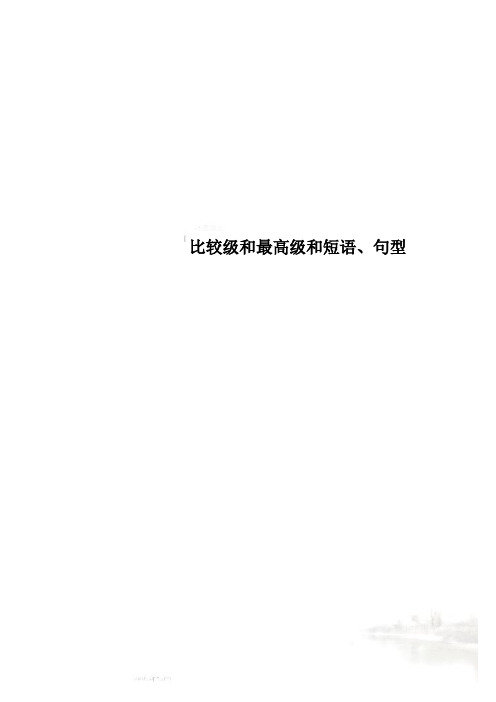
比较级和最高级和短语、句型序数词first 1st second 2nd third 3rd fourth 4th fifth 5th sixth 6th seventh 7th eighth 8th ninth 9th tenth 10th eleventh 11th twelfth 12th thirteenth 13th fourteenth 14th fifteenth 15th sixteenth 16th eighteenth 18th nineteenth 19th twentieth 20th twenty---first 21st thirtieth 30th thirty---first 31st星期Sunday Monday Tuesday Wednesday Thursday Friday Saturday月份January February March April May June July August September October November December人称代词I you he she it we you they物主代词my your his her its our your their mine yours his hers its ours yours theirs 宾语me you him her its us you themUnit 1:1 I had a dream2 last night3 on Mars4 in /my/his/her dream5 in a spaceship6 in space7 many stars8 very cold 9 had a lot of fun10 had a fun11 had a good time12 had some fun13 at home14 at school15 at the supermarket16 at the park17 at the busstation18 at the movie theater19 yesterday afternoon20 a good movie21 had an English class22 in the kitchen 23on the moon24 from the earth25 this holiday1 我做了一个梦2 昨晚3 在火星上4在我的/他的/她的梦里5 在宇宙飞船里6在太空7许多星星8非常冷9过的愉快10过的愉快11过的愉快12过的愉快13 在家14 在学校15 在超级市场16在公园17在公共汽车站18在电影院19昨天下午20一场好的电影21有一节英语课22在厨房23 在月球24来自地球25 这个假日26 in Beijing27 in a library28 yesterday evening29 last week30 In the hospital31 had no brother/sister32 had no money33 had no food for dinner34 lived with…..35 very poor36 very sad37 last SundayUnit 21 come in2 eat breakfast3 yesterday morning4 come to5 very quickly6 very slowly7 made a mess8 look sick9 on the back10 clean the table11 clean the house12 clean the class room13 clean my bedroom14 clean the floor15 visit my friend16 want a banana17 watch TV18 go home /went home19 go to school/went to school20 play football21 go to the supermarket22 eat lunch23 watch a movie24 see a movie26 在北京27 在图书馆28 昨天晚上29 上周30在医院31没有兄妹32没有钱33晚餐没有食物34 和….一起居住35非常穷36 非常伤心37 上周日进来吃早饭昨天早晨来非常快非常快弄脏看上去病了后背擦桌子打扫房间打扫教室打扫卧室扫地看望我的朋友想要一个香蕉看电视回家去上学踢足球去超市吃午饭看电影看电影25 wash his dog26 wash my clothes27 go shopping /went shopping28 wash her socks29 listen to the radio30 listen to music31 the next day32 read the book33 on vacation34 do my homework35 every day36 go to the park37 had a picnic38 in my bedroom39 at seven thirty40 at eight o’clock41 in the evening 42had a bad day 43 go to Ken’s house44go swimming 45go to theswimming pool46want to go swimming47 at last48 in the garden49 next to50 at the table51 look at52 clean my bedroom53 Mocky visit me54 go to Ken’s house55 play with my friendsUnit 31 in some races2 in a race3 win a/the race4 have a/the prize 25洗狗26洗我的衣服27购物28洗她的袜子29听收音机30听音乐31第二天32读书33在假日34做作业35每天36去公园37野餐38在我的卧室39在七点三十40在八点41在晚上42伤心的一天43去ken的房间44去游泳45去游泳池46想去游泳47在最后48在花园49旁边50在桌旁51看一看52打扫我的卧室53Mocky 看望我54去Ken的房子55和我的朋友玩1在一些比赛中2在一场比赛中3赢了一场比赛4有一个奖品5 jump high6 high jump7 win a/the prize8 very well9 in the frist race10 very fast11 very excited12 in the second race13 in the competition14 one hundred15 one thousand16 a swimming race17 climb up18 in front of19 knock at the door20 school sports day21walk into the house22on the table23 at the table24 had a swimming race25 after the race26 a glass of milk27 an hour28 I had a great time29 decided to do something30 after the race 31 by bus32 a glass of milk33 an hour34 beforeAfterin the middle last35went into the living roomwent into the bedroomwent into the kitchenwent into the bathroom36 I had a great time5跳得高6跳高7赢了一个奖品8非常好9在第一场比赛里10非常快11非常激动12在第二场比赛里13在比赛里14一百15一千16一场游泳比赛17向上爬18在。
高中英语知识点归纳比较级和最高级的句型
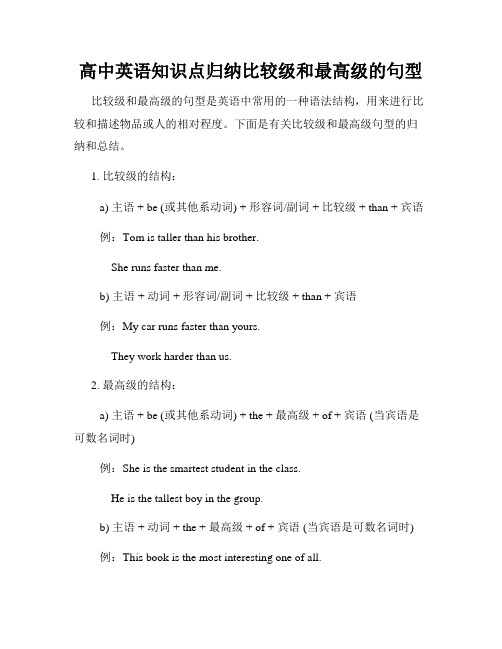
高中英语知识点归纳比较级和最高级的句型比较级和最高级的句型是英语中常用的一种语法结构,用来进行比较和描述物品或人的相对程度。
下面是有关比较级和最高级句型的归纳和总结。
1. 比较级的结构:a) 主语 + be (或其他系动词) + 形容词/副词 + 比较级 + than + 宾语例:Tom is taller than his brother.She runs faster than me.b) 主语 + 动词 + 形容词/副词 + 比较级 + than + 宾语例:My car runs faster than yours.They work harder than us.2. 最高级的结构:a) 主语 + be (或其他系动词) + the + 最高级 + of + 宾语 (当宾语是可数名词时)例:She is the smartest student in the class.He is the tallest boy in the group.b) 主语 + 动词 + the + 最高级 + of + 宾语 (当宾语是可数名词时)例:This book is the most interesting one of all.They are the best athletes in the team.3. 比较级和最高级的句型常用于以下情境:a) 比较两者之间的差异或相似程度- 比较级:A is + 形容词/副词 + than B例:This car is more expensive than that one.He works harder than his sister.- 最高级:A is the + 最高级 + of (all/in) B 例:This is the longest bridge in the country.She is the smartest student in the class.b) 描述一组三者或多者之间的差异或相似程度 - 比较级:A is + 形容词/副词 + than B and C 例:This car is faster than any other car in the race. He runs more quickly than his siblings.- 最高级:A is the + 最高级 + in/of (all) B and C 例:This is the biggest park in the city.She is the tallest among all her friends.4. 比较级和最高级的形容词和副词变化规则:a) 一般形容词/副词 + -er (比较级) + -est (最高级)例:fast - faster - fastesttall - taller - tallestb) 以-e结尾的形容词/副词 + -r (比较级) + -st (最高级)例:large - larger - largestnice - nicer - nicestc) 重读闭音节,末尾只有一个辅音字母的形容词/副词,需双写最后一个辅音字母 + -er (比较级) + -est (最高级)例:big - bigger - biggesthot - hotter - hottest总结:比较级和最高级的句型是一种用来进行比较和描述相对程度的常用语法结构。
比较级和最高级和短语、句型
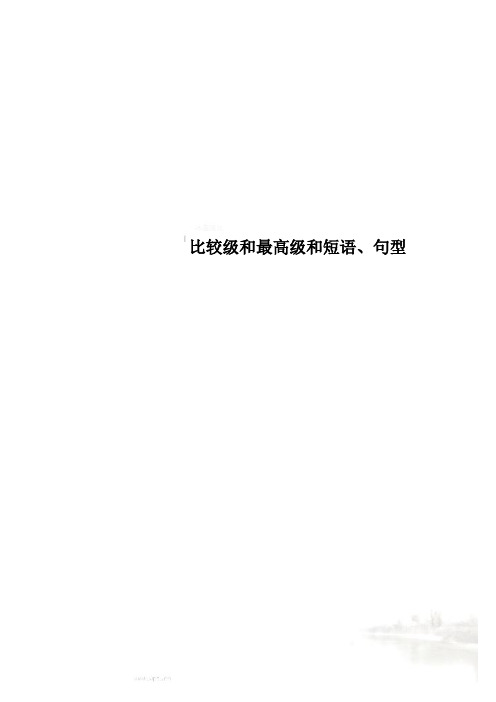
比较级和最高级和短语、句型疑问词:When where which which season which month which gamewhich sport which subject what who whose how many how muchHow long how old how tall how heavy表示时间的词usually always often some time hardly ever never表示过去时间的词this morning this afternoon this evening this noonlast morning last afternoon last evening last noon last year last monthlast week last Monday last Tuesday last Wednesday last Thursdaylast Friday last Saturday three years old three days old last Sundaythree mouths old the day before yesterday表示将来时间的词will: tomorrow next year next month next week next day next Sundaynext Monday next Tuesday next Wednesday next Thursdaynext Friday next Saturday表示时间的词today now every day twice a day every week every mouth every yearonce a year twice a mouth数词One1 two2 three3 four4 five5 six6 seven7 eight8 nine9 ten10 eleven11 twelve12 thirteen13 fourteen14 fifteen15 sixteen16 seventeen17 eighteen18 nineteen19 twenty20 twenty---one21 thirty30 forty40 fifty50 sixty60 seventy70 eighty80 ninety90one hundred100序数词first 1st second 2nd third 3rd fourth 4th fifth 5th sixth 6th seventh 7th eighth 8th ninth 9th tenth 10th eleventh 11th twelfth 12th thirteenth 13th fourteenth 14th fifteenth 15th sixteenth 16th eighteenth 18th nineteenth 19th twentieth 20th twenty---first 21st thirtieth 30th thirty---first 31st星期Sunday Monday Tuesday Wednesday Thursday Friday Saturday月份January February March April May June July August September October November December人称代词I you he she it we you they物主代词my your his her its our your their mine yours his hers its ours yours theirs 宾语me you him her its us you themUnit 1:1 I had a dream2 last night3 on Mars4 in /my/his/her dream5 in a spaceship6 in space7 many stars8 very cold 9 had a lot of fun10 had a fun11 had a good time12 had some fun13 at home14 at school15 at the supermarket16 at the park17 at the busstation18 at the movie theater19 yesterday afternoon20 a good movie21 had an English class22 in the kitchen 23on the moon24 from the earth25 this holiday1 我做了一个梦2 昨晚3 在火星上4在我的/他的/她的梦里5 在宇宙飞船里6在太空7许多星星8非常冷9过的愉快10过的愉快11过的愉快12过的愉快13 在家14 在学校15 在超级市场16在公园17在公共汽车站18在电影院19昨天下午20一场好的电影21有一节英语课22在厨房23 在月球24来自地球25 这个假日26 in Beijing27 in a library28 yesterday evening29 last week30 In the hospital31 had no brother/sister32 had no money33 had no food for dinner34 lived with…..35 very poor36 very sad37 last SundayUnit 21 come in2 eat breakfast3 yesterday morning4 come to5 very quickly6 very slowly7 made a mess8 look sick9 on the back10 clean the table11 clean the house12 clean the class room13 clean my bedroom14 clean the floor15 visit my friend16 want a banana17 watch TV18 go home /went home19 go to school/went to school20 play football21 go to the supermarket22 eat lunch23 watch a movie24 see a movie26 在北京27 在图书馆28 昨天晚上29 上周30在医院31没有兄妹32没有钱33晚餐没有食物34 和….一起居住35非常穷36 非常伤心37 上周日进来吃早饭昨天早晨来非常快非常快弄脏看上去病了后背擦桌子打扫房间打扫教室打扫卧室扫地看望我的朋友想要一个香蕉看电视回家去上学踢足球去超市吃午饭看电影看电影25 wash his dog26 wash my clothes27 go shopping /went shopping28 wash her socks29 listen to the radio30 listen to music31 the next day32 read the book33 on vacation34 do my homework35 every day36 go to the park37 had a picnic38 in my bedroom39 at seven thirty40 at eight o’clock41 in the evening 42had a bad day 43 go to Ken’s house44go swimming 45go to theswimming pool46want to go swimming47 at last48 in the garden49 next to50 at the table51 look at52 clean my bedroom53 Mocky visit me54 go to Ken’s house55 play with my friendsUnit 31 in some races2 in a race3 win a/the race4 have a/the prize 25洗狗26洗我的衣服27购物28洗她的袜子29听收音机30听音乐31第二天32读书33在假日34做作业35每天36去公园37野餐38在我的卧室39在七点三十40在八点41在晚上42伤心的一天43去ken的房间44去游泳45去游泳池46想去游泳47在最后48在花园49旁边50在桌旁51看一看52打扫我的卧室53Mocky 看望我54去Ken的房子55和我的朋友玩1在一些比赛中2在一场比赛中3赢了一场比赛4有一个奖品5 jump high6 high jump7 win a/the prize8 very well9 in the frist race10 very fast11 very excited12 in the second race13 in the competition14 one hundred15 one thousand16 a swimming race17 climb up18 in front of19 knock at the door20 school sports day21walk into the house22on the table23 at the table24 had a swimming race25 after the race26 a glass of milk27 an hour28 I had a great time29 decided to do something30 after the race 31 by bus32 a glass of milk33 an hour34 beforeAfterin the middle last35went into the living roomwent into the bedroomwent into the kitchenwent into the bathroom36 I had a great time5跳得高6跳高7赢了一个奖品8非常好9在第一场比赛里10非常快11非常激动12在第二场比赛里13在比赛里14一百15一千16一场游泳比赛17向上爬18在。
高中英语知识点归纳比较级和最高级的句型和用法
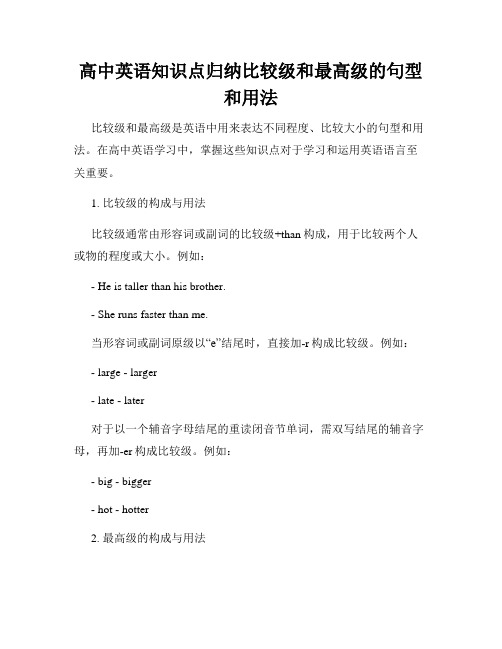
高中英语知识点归纳比较级和最高级的句型和用法比较级和最高级是英语中用来表达不同程度、比较大小的句型和用法。
在高中英语学习中,掌握这些知识点对于学习和运用英语语言至关重要。
1. 比较级的构成与用法比较级通常由形容词或副词的比较级+than构成,用于比较两个人或物的程度或大小。
例如:- He is taller than his brother.- She runs faster than me.当形容词或副词原级以“e”结尾时,直接加-r构成比较级。
例如:- large - larger- late - later对于以一个辅音字母结尾的重读闭音节单词,需双写结尾的辅音字母,再加-er构成比较级。
例如:- big - bigger- hot - hotter2. 最高级的构成与用法最高级通常由形容词或副词的最高级+in/of+所有格代词/名词构成,表示三者或三者以上的比较。
例如:- He is the tallest boy in our class.- This is the most beautiful place I have ever seen.形容词或副词原级以“y”结尾时,改“y”为“i”,再加-est构成最高级。
例如:- happy - happiest- pretty - prettiest对于以一个辅音字母结尾的重读闭音节单词,需双写结尾的辅音字母,再加-est构成最高级。
例如:- big - biggest- hot - hottest3. 比较级和最高级的常见句型- The + 比较级..., the + 比较级...(越......越......)例如:The more you practice, the better your English will be.- 比较级+and+比较级(越来越......)例如:The weather is getting colder and colder.- A is + 形容词原级, B is + 形容词原级(A与B一样......)例如:John is as tall as his father.- 没有比较级的程度副词前可以加more或most,表示最高级的程度例如:She sings most beautifully.4. 特殊形式的比较级和最高级- good - better - best(好)- bad - worse - worst(坏)- little - less - least(少)- many/much - more - most(多)5. 注意事项- 当比较的事物只有两个时,使用更高级。
比较级和最高级用法归纳
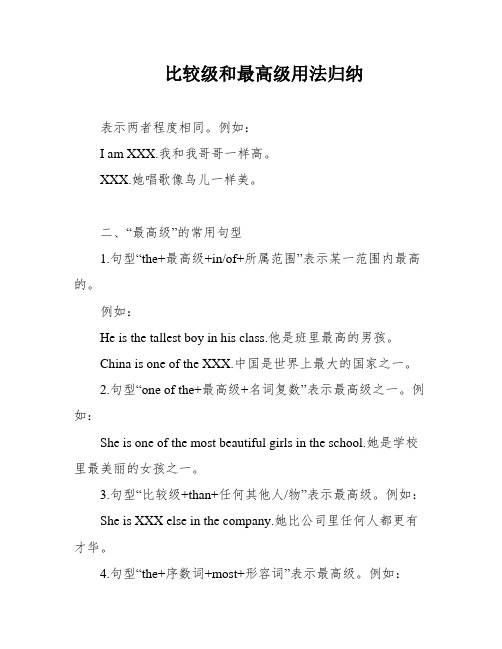
比较级和最高级用法归纳表示两者程度相同。
例如:I am XXX.我和我哥哥一样高。
XXX.她唱歌像鸟儿一样美。
二、“最高级”的常用句型1.句型“the+最高级+in/of+所属范围”表示某一范围内最高的。
例如:He is the tallest boy in his class.他是班里最高的男孩。
China is one of the XXX.中国是世界上最大的国家之一。
2.句型“one of the+最高级+名词复数”表示最高级之一。
例如:She is one of the most beautiful girls in the school.她是学校里最美丽的女孩之一。
3.句型“比较级+than+任何其他人/物”表示最高级。
例如:She is XXX else in the company.她比公司里任何人都更有才华。
4.句型“the+序数词+most+形容词”表示最高级。
例如:He is the most handsome man I have ever met.他是我见过的最帅的男人。
注意:1.修饰最高级常用词和短语主要有:by far。
easily。
definitely。
XXX。
XXX等。
例如:This is by far the best movie I have ever seen.这是我看过的最好的电影。
2.最高级前面不加冠词the,但加定冠词XXX表示特指。
例如:She is the most XXX.她是班里最聪明的女孩(特指)。
比较级和最高级是英语语法中重要的一部分,掌握好这些常用句型和修饰词语,能够更好地表达自己的意思。
XXX form "not as/so + adj/adv + as"XXX Degree1.XXX definite article "the" must be used before the superlative form of an adjective (the superlative form of an adverb can omit "the")。
英语语法比较级和最高级用法知识点归纳总结
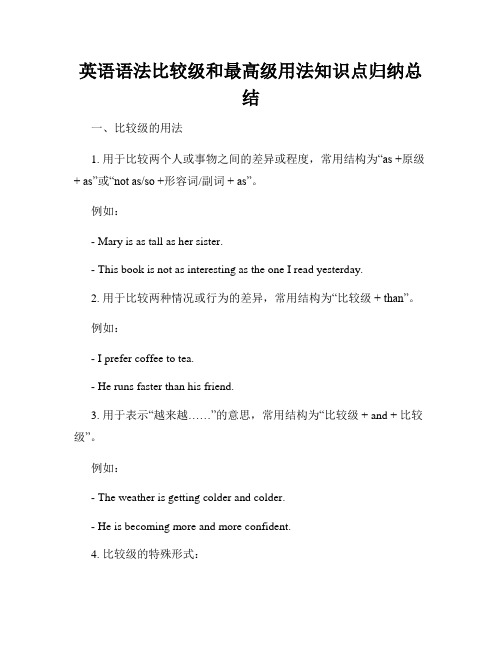
英语语法比较级和最高级用法知识点归纳总结一、比较级的用法1. 用于比较两个人或事物之间的差异或程度,常用结构为“as +原级+ as”或“not as/so +形容词/副词+ as”。
例如:- Mary is as tall as her sister.- This book is not as interesting as the one I read yesterday.2. 用于比较两种情况或行为的差异,常用结构为“比较级+ than”。
例如:- I prefer coffee to tea.- He runs faster than his friend.3. 用于表示“越来越……”的意思,常用结构为“比较级 + and + 比较级”。
例如:- The weather is getting colder and colder.- He is becoming more and more confident.4. 比较级的特殊形式:- 以字母e结尾的形容词,去掉e再加-er。
- 以重读闭音节结尾的单音节形容词和部分双音节形容词,直接加-er。
- 以“辅音字母+y”结尾的形容词,把y变成i再加-er。
例如:- nice → nicer- big → bigger- happy → happier二、最高级的用法1. 用于三个或三个以上人或事物之间的比较,表示最高程度,常用结构为“the + 最高级”。
例如:- She is the tallest girl in the class.- This is the most interesting book I've ever read.2. 最高级的特殊形式:- 以字母e结尾的形容词,去掉e再加-st。
- 以重读闭音节结尾的单音节形容词和部分双音节形容词,直接加-st。
- 以“辅音字母+y”结尾的形容词,把y变成i再加-est。
例如:- nice → nicest- big → biggest- happy → happiest三、比较级和最高级的不规则形式1. 比较级和最高级的不规则形式:good → better → best, bad → worse → worst, many/much → more → most, little → less→ least。
比较级和最高级的语法
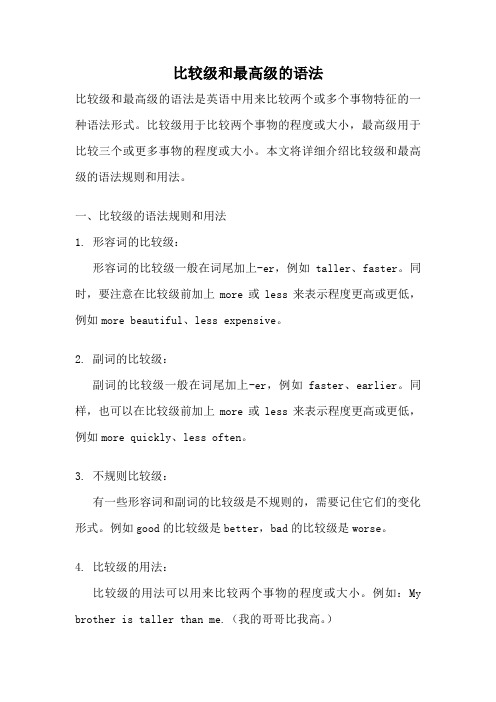
比较级和最高级的语法比较级和最高级的语法是英语中用来比较两个或多个事物特征的一种语法形式。
比较级用于比较两个事物的程度或大小,最高级用于比较三个或更多事物的程度或大小。
本文将详细介绍比较级和最高级的语法规则和用法。
一、比较级的语法规则和用法1. 形容词的比较级:形容词的比较级一般在词尾加上-er,例如taller、faster。
同时,要注意在比较级前加上more或less来表示程度更高或更低,例如more beautiful、less expensive。
2. 副词的比较级:副词的比较级一般在词尾加上-er,例如faster、earlier。
同样,也可以在比较级前加上more或less来表示程度更高或更低,例如more quickly、less often。
3. 不规则比较级:有一些形容词和副词的比较级是不规则的,需要记住它们的变化形式。
例如good的比较级是better,bad的比较级是worse。
4. 比较级的用法:比较级的用法可以用来比较两个事物的程度或大小。
例如:My brother is taller than me.(我的哥哥比我高。
)二、最高级的语法规则和用法1. 形容词的最高级:形容词的最高级一般在词尾加上-est,例如tallest、fastest。
同时,要注意在最高级前加上the来表示最高程度,例如the most beautiful、the least expensive。
2. 副词的最高级:副词的最高级一般在词尾加上-est,例如fastest、earliest。
同样,也可以在最高级前加上the来表示最高程度,例如the most quickly、the least often。
3. 不规则最高级:有一些形容词和副词的最高级是不规则的,需要记住它们的变化形式。
例如good的最高级是best,bad的最高级是worst。
4. 最高级的用法:最高级的用法可以用来比较三个或更多事物的程度或大小。
英语中形容词副词比较级最高级重点句型归纳
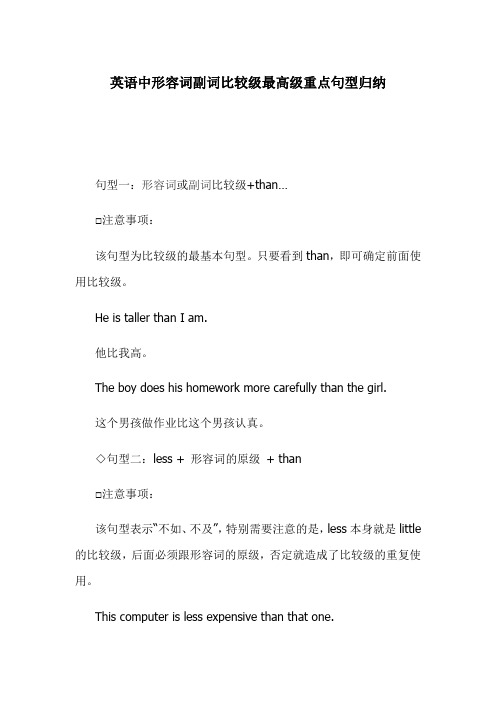
英语中形容词副词比较级最高级重点句型归纳句型一:形容词或副词比较级+than…□注意事项:该句型为比较级的最基本句型。
只要看到than,即可确定前面使用比较级。
He is taller than I am.他比我高。
The boy does his homework more carefully than the girl.这个男孩做作业比这个男孩认真。
◇句型二:less + 形容词的原级+ than□注意事项:该句型表示“不如、不及”,特别需要注意的是,less本身就是little 的比较级,后面必须跟形容词的原级,否定就造成了比较级的重复使用。
This computer is less expensive than that one.这台电脑比那台便宜。
◇句型三:as +形容词或副词的原级+ as□注意事项:该句型表示对比的两者程度相当,as之间必须跟形容词或副词的原级,决不能使用比较级。
此外,还要确定使用形容词还是副词。
确定的依据就是根据第一个as前的动词,如果是系动词(如be,感官动词look, sound, smell, taste, feel等),那么就用形容词的原级,如果前面的动词是一般的实义动词,那么就必须用副词的原级修饰动词。
This lesson is as easy as that one.这节课和那节课一样容易。
Lucy talks with old people as politely as her sister.露西和老人交谈和与他妹妹交谈一样礼貌。
特别提醒:as…as之间也可以跟名词,句型如下:☆as +形容词+ a/an +单数名词+asHe is as kind a person as his father.他和他爸爸一样都是善良的人。
☆as + many/much+不可数名词/可数名词复数+asI can carry as much paper as you can.你能搬多少纸,我也能。
高中英语语法比较级和最高级讲解
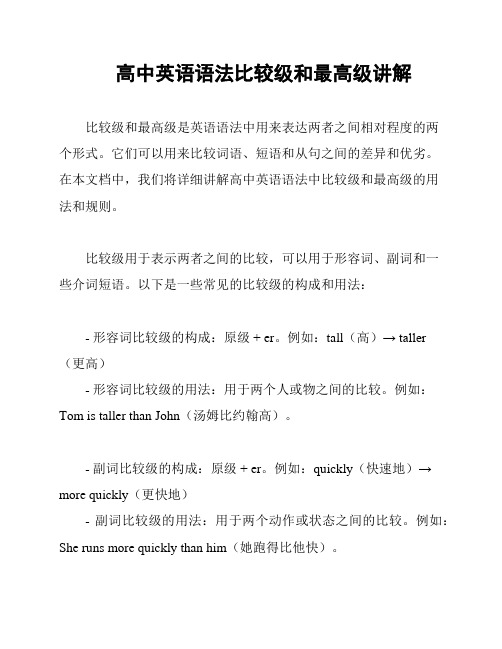
高中英语语法比较级和最高级讲解比较级和最高级是英语语法中用来表达两者之间相对程度的两个形式。
它们可以用来比较词语、短语和从句之间的差异和优劣。
在本文档中,我们将详细讲解高中英语语法中比较级和最高级的用法和规则。
比较级用于表示两者之间的比较,可以用于形容词、副词和一些介词短语。
以下是一些常见的比较级的构成和用法:- 形容词比较级的构成:原级 + er。
例如:tall(高)→ taller(更高)- 形容词比较级的用法:用于两个人或物之间的比较。
例如:Tom is taller than John(汤姆比约翰高)。
- 副词比较级的构成:原级 + er。
例如:quickly(快速地)→ more quickly(更快地)- 副词比较级的用法:用于两个动作或状态之间的比较。
例如:She runs more quickly than him(她跑得比他快)。
- 一些介词短语比较级的用法:例如:in the same way(以相同的方式)、more than(比...更多)等。
2. 最高级(Superlative)最高级用于表示三者或三者以上之间的比较,可以用于形容词、副词和一些介词短语。
以下是一些常见的最高级的构成和用法:- 形容词最高级的构成:原级 + est。
例如:tall(高)→ tallest (最高的)- 形容词最高级的用法:用于三个或三个以上的人或物之间的比较。
例如:Tom is the tallest in the class(汤姆是班级里最高的)。
- 副词最高级的构成:原级 + est。
例如:quickly(快速地)→ most quickly(最快地)- 副词最高级的用法:用于三个或三个以上的动作或状态之间的比较。
例如:She runs the most quickly in the team(她在团队中跑得最快)。
- 一些介词短语最高级的用法:例如:in the same way(以相同的方式)、the most(最多)等。
关于英语比较级和最高级的用法
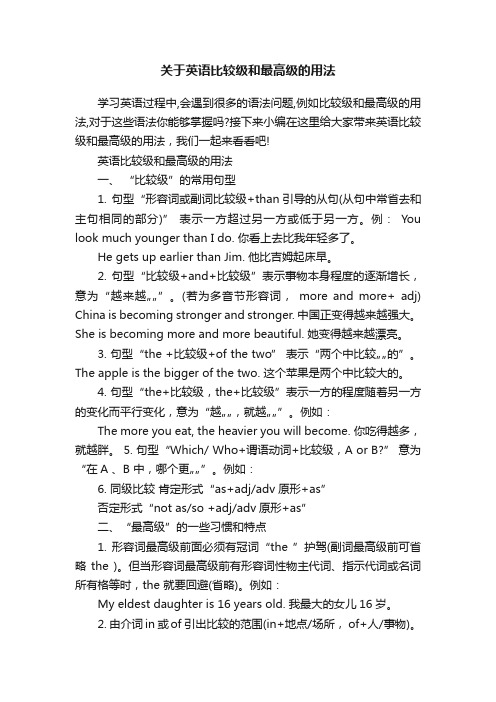
关于英语比较级和最高级的用法学习英语过程中,会遇到很多的语法问题,例如比较级和最高级的用法,对于这些语法你能够掌握吗?接下来小编在这里给大家带来英语比较级和最高级的用法,我们一起来看看吧!英语比较级和最高级的用法一、“比较级”的常用句型1. 句型“形容词或副词比较级+than引导的从句(从句中常省去和主句相同的部分)” 表示一方超过另一方或低于另一方。
例:You look much younger than I do. 你看上去比我年轻多了。
He gets up earlier than Jim. 他比吉姆起床早。
2. 句型“比较级+and+比较级”表示事物本身程度的逐渐增长,意为“越来越……”。
(若为多音节形容词,more and more+ adj) China is becoming stronger and stronger. 中国正变得越来越强大。
She is becoming more and more beautiful. 她变得越来越漂亮。
3. 句型“the +比较级+of the two” 表示“两个中比较……的”。
The apple is the bigger of the two. 这个苹果是两个中比较大的。
4. 句型“the+比较级,the+比较级”表示一方的程度随着另一方的变化而平行变化,意为“越……,就越……”。
例如:The more you eat, the heavier you will become. 你吃得越多,就越胖。
5. 句型“Which/ Who+谓语动词+比较级,A or B?” 意为“在A 、B 中,哪个更……”。
例如:6. 同级比较肯定形式“as+adj/adv 原形+as”否定形式“not as/so +adj/adv原形+as”二、“最高级”的一些习惯和特点1. 形容词最高级前面必须有冠词“the ”护驾(副词最高级前可省略the )。
但当形容词最高级前有形容词性物主代词、指示代词或名词所有格等时,the 就要回避(省略)。
常见比较级和最高级的用法归纳
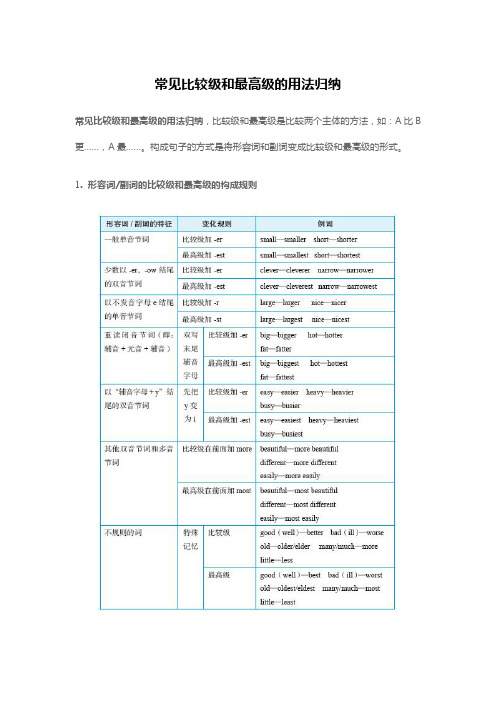
常见比较级和最高级的用法归纳常见比较级和最高级的用法归纳,比较级和最高级是比较两个主体的方法,如:A比B 更……,A最……。
构成句子的方式是将形容词和副词变成比较级和最高级的形式。
1. 形容词/副词的比较级和最高级的构成规则注意:形容词most前面如果没有the,就不表示最高级的含义,而是表示“非常”。
例句:It is a most important problem.语法:most前没有the,表示“非常”,该句还可以转化为:It is a very important problem.译文:它是一个非常重要的问题。
2. 形容词/副词比较级的用法(1)两者之间的比较,通常用连词than引导。
基本句型:“A+be/实义动词+形容词/副词比较级+than+B”,表示A比B更……。
例句:This train runs faster than that one.语法:faster是副词fast的比较级。
译文:这列火车比那列跑得更快。
(2)“less+原级(双音节和多音节)+than…”,表示“不如……”。
例句:Tim is less healthy than Tom.语法:less healthy than是“less+原级+than…”结构。
译文:提姆比汤姆体质要差。
(3)两者之间选择,其结构为:“which/who…+比较级,…or…?”例句:Which is bigger, the earth or the moon语法:bigger是big的比较级。
译文:地球和月亮哪个更大?(4)“比较级+and+比较级”,或“more and more+原级”表示“越来越……”。
例句:Shanghai is becoming more and more modern.语法:more and more modern为“more and more+原级”结构。
译文:上海正变得越来越现代化。
(5)“The+比较级,the+比较级”,表示“越……,越……”。
(完整版)高中英语的比较级和最高级用法总结
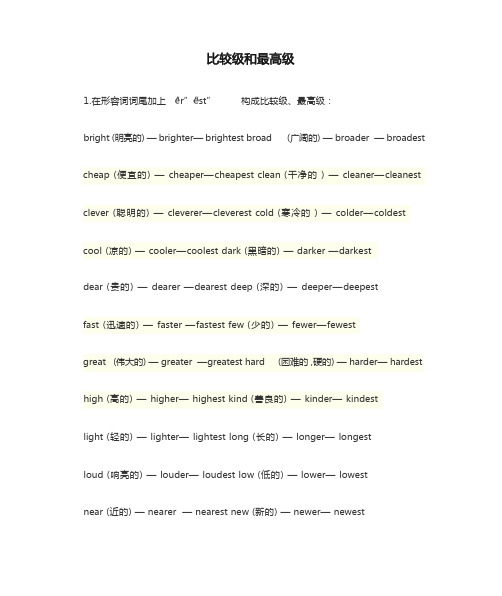
1.在形容词词尾加上r”st” 构成比较级、最高级:bright (明亮的) — brighter— brightest broad (广阔的) — broader — broadest cheap (便宜的) — cheaper—cheapest clean (干净的 ) — cleaner—cleanest clever (聪明的) — cleverer—cleverest cold (寒冷的 ) — colder—coldest cool (凉的) — cooler—coolest dark (黑暗的) — darker —darkestdear (贵的) — dearer —dearest deep (深的) — deeper—deepestfast (迅速的) — faster —fastest few (少的) — fewer—fewestgreat (伟大的) — greater —greatest hard (困难的 ,硬的) — harder— hardest high (高的) — higher— highest kind (善良的) — kinder— kindestlight (轻的) — lighter— lightest long (长的) — longer— longestloud (响亮的) — louder— loudest low (低的) — lower— lowestnear (近的) — nearer — nearest new (新的) — newer— newestpoor (穷的) — poorer — poorest quick (快的) — quicker —quickest quiet (安静的) — quieter—quietest rich (富裕的) — richer— richest short (短的) — shorter—shortest slow (慢的) — slower—slowestsmall (小的) — smaller—smallest smart (聪明的) — smarter—smartest soft (柔软的) — softer —softest strong (强壮的) — stronger—strongest sweet (甜的) — sweeter—sweetest tall (高的) -taller-tallestthick (厚的) — thicker —thickest warm (温暖的 ) — warmer—warmest weak (弱的) —weaker —weakest young (年轻的 ) — younger—youngest 2.双写最后一个字母,再加上r”st”构成比较级、最高级:big (大的) — bigger— biggest fat (胖的) — fatter—fattesthot (热的) — hotter— hottest red (红的) — redder — reddestsad (伤心的) — sadder—saddestthin (瘦的) — thinner—thinnest3.以不发音的字母 e 结尾的形容词,加上“r” “st” 构成比较级、最高级:able (能干的) — abler—ablest brave (勇敢的) — braver — bravestclose (接近的) — closer—closest fine (好的,完美的) — finer—finest large (巨大的) — larger — largest late (迟的) — later— latestnice (好的) — nicer— nicest ripe (成熟的) — riper— ripestrude (粗鲁的 ) — ruder— rudest safe (安全的) — safer—safeststrange (奇怪的) — stranger—strangest wide (宽广的) — wider—widest wise (睿智的 ,聪明的) —wiser—wisestwhite (白的)—whiter—whitest4.以字母 y 结尾的形容词 ,把 y 改为 i,再加上“er”st”构成比较级、最高级:busy (忙碌的) — busier— busiest dirty (脏的) — dirtier—dirtiestdry (干燥的 ) — drier—driest early (早的) — earlier—earliesteasy (容易的) — easier—easiest friendly (友好的) — friendlier—friendliest funny (好玩的) — funnier—funniest happy (开心的) — happier— happiest healthy (健康的) — healthier— healthiest heavy (重的) — heavier— heaviest hungry (饿的) — hungrier— hungriest lazy (懒惰的 ) — lazier— laziestlucky(幸运的) — luckier— luckiest naughty (调皮的) — naughtier— naughtiest noisy (嘈杂的) — noisier— noisiest pretty (美丽的) — prettier— prettiestsilly (傻的) — sillier—silliest spicy (辣的) — spicier—spiciestthirsty (渴的) — thirstier—thirstiest ugly (丑的) — uglier— ugliest5.双音节、多音节形容词 ,在单词前面加上m“ore”m“ost”构成比较级、最高级:afraid (害怕的) — more afraid— most afraidbeautiful (美丽的) — more beautiful — most beautifulcareful (仔细的) — more careful — most carefulcheerful (开心的) — more cheerful— most cheerfulcrowded (拥挤的) — more crowded — most crowdeddangerous (危险的) — more dangerous — most dangerous delicious (美味的) — more delicious — most deliciousdifficult (困难的) — more difficult — most difficultexciting (令人兴奋的) — more exciting — most exciting expensive (昂贵的) — more expensive — most expensivefamous (著名的) — more famous — most famousfrightened (受惊的) — more frightened — most frightened frightening (令人害怕的) — more frightening — most frightening hard-working (勤奋的) — more hard-working — most hard-working helpful (有帮助的) — more helpful — most helpfulhonest (诚实的) — more honest — most honestimportant (重要的) — more important — most important interesting (有趣的) — more interesting — most interesting polite (有礼貌的 ) — more polite — most politeterrible (可怕的) — more terrible — most terribletired (累的) — more tired — most tired6.不规则变化的形容词:bad (坏的) —worse—worstfar (远的) — farther—farthest (far—further—furthest)good (好的) — better— bestill (病的)—worse—worstlittle (少的) — less— leastmany (多的) — more — most much (多的) — more — mostold ( 年老的 ) — older—oldest ( old—elder—eldest) well ( 好的 ,身体好的 )— better— best原级用法: as +adj/adv. 的原级+ as , 否定式 (not) so…as…只能修饰原级的词, very ,quite ,so ,tooeg. The ruler is as long as that one.He sings as well as Jack.He doesn’t sing as(so) well as Jack.形容词比较级的用法:形容词的比较级用于两个人或事物的比较 , 结构形式如下:1. A + is/ am/ are + 形容词比较级 + than + BShe is taller than I.Tomis more athletic thanSam.It is _________________today than it was yesterday. 今天的天气比昨天暖和。
比较级和最高级的用法:修饰介词短语
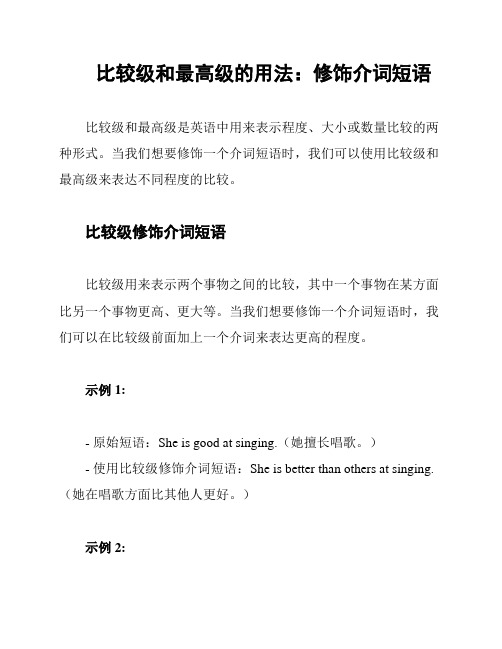
比较级和最高级的用法:修饰介词短语比较级和最高级是英语中用来表示程度、大小或数量比较的两种形式。
当我们想要修饰一个介词短语时,我们可以使用比较级和最高级来表达不同程度的比较。
比较级修饰介词短语比较级用来表示两个事物之间的比较,其中一个事物在某方面比另一个事物更高、更大等。
当我们想要修饰一个介词短语时,我们可以在比较级前面加上一个介词来表达更高的程度。
示例 1:- 原始短语:She is good at singing.(她擅长唱歌。
)- 使用比较级修饰介词短语:She is better than others at singing.(她在唱歌方面比其他人更好。
)示例 2:- 原始短语:He is fast on the track.(他在赛道上跑得很快。
)最高级修饰介词短语最高级用来表示三个或三个以上事物之间的比较,其中一个事物在某方面是最高的。
当我们想要修饰一个介词短语时,我们可以在最高级前面加上一个介词来表达最高的程度。
示例 1:- 原始短语:They are good at playing basketball.(他们擅长打篮球。
)- 使用最高级修饰介词短语:They are the best among their peers at playing basketball.(他们在打篮球方面是同龄人中最好的。
)示例 2:- 原始短语:She is knowledgeable in history.(她在历史上很有知识。
)- 使用最高级修饰介词短语:She is the most knowledgeable about history among her classmates.(她在历史方面在她的同学中最有知识。
)以上就是比较级和最高级修饰介词短语的基本用法和示例。
通过运用比较级和最高级,我们可以更准确地表达事物之间的程度差异。
在写作中,我们可以灵活运用这些语法结构,使文句更具表现力和准确性。
比较级和最高级句型
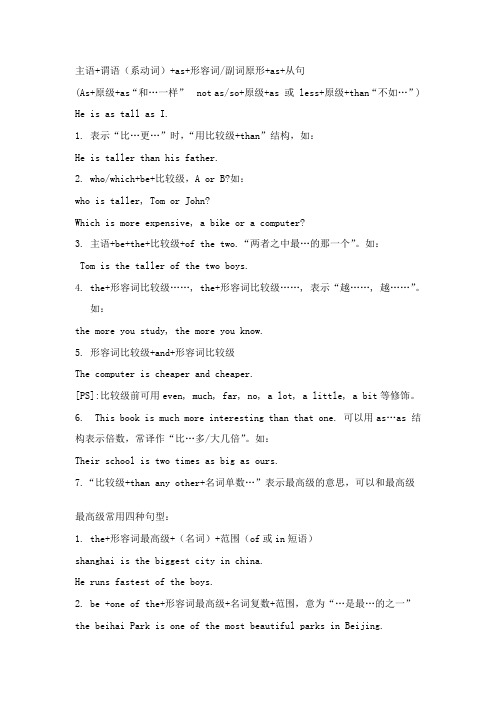
主语+谓语(系动词)+as+形容词/副词原形+as+从句(As+原级+as“和…一样” not as/so+原级+as 或 less+原级+than“不如…”) He is as tall as I.1.表示“比…更…”时,“用比较级+than”结构,如:He is taller than his father.2.who/which+be+比较级,A or B?如:who is taller, Tom or John?Which is more expensive, a bike or a computer?3.主语+be+the+比较级+of the two.“两者之中最…的那一个”。
如:Tom is the taller of the two boys.4.the+形容词比较级……, the+形容词比较级……, 表示“越……, 越……”。
如:the more you study, the more you know.5.形容词比较级+and+形容词比较级The computer is cheaper and cheaper.[PS]:比较级前可用even, much, far, no, a lot, a little, a bit等修饰。
6. This book is much more interesting than that one. 可以用as…as 结构表示倍数,常译作“比…多/大几倍”。
如:Their school is two times as big as ours.7.“比较级+than any other+名词单数…”表示最高级的意思,可以和最高级最高级常用四种句型:1.the+形容词最高级+(名词)+范围(of或in短语)shanghai is the biggest city in china.He runs fastest of the boys.2.be +one of the+形容词最高级+名词复数+范围,意为“…是最…的之一”the beihai Park is one of the most beautiful parks in Beijing.3.be+the+序数词+形容词最高级+名词单数+范围,意为“是第几个最…”The Yellow River is the second longest river in china.4.who/which + be +最高级,A,B or C?who is the tallest, Tom, Jack of David?[PS]:1. 表示范围的两个介词in, of 的区别:介词in 后面接的是某单位、集体。
比较级最高级的用法和句型例句
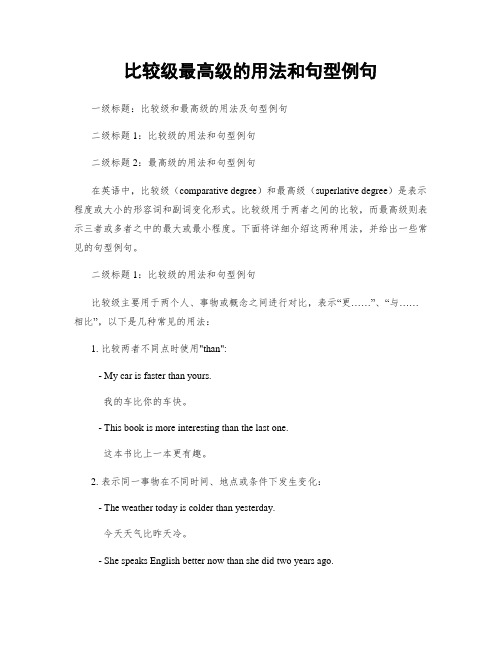
比较级最高级的用法和句型例句一级标题:比较级和最高级的用法及句型例句二级标题1:比较级的用法和句型例句二级标题2:最高级的用法和句型例句在英语中,比较级(comparative degree)和最高级(superlative degree)是表示程度或大小的形容词和副词变化形式。
比较级用于两者之间的比较,而最高级则表示三者或多者之中的最大或最小程度。
下面将详细介绍这两种用法,并给出一些常见的句型例句。
二级标题1:比较级的用法和句型例句比较级主要用于两个人、事物或概念之间进行对比,表示“更……”、“与……相比”,以下是几种常见的用法:1. 比较两者不同点时使用"than":- My car is faster than yours.我的车比你的车快。
- This book is more interesting than the last one.这本书比上一本更有趣。
2. 表示同一事物在不同时间、地点或条件下发生变化:- The weather today is colder than yesterday.今天天气比昨天冷。
- She speaks English better now than she did two years ago.她现在说英语说得比两年前好。
3. 表示程度或频率的变化:- Tom runs faster than his brother.汤姆比他哥哥跑得快。
- I study harder than before.我比以前更加努力学习。
4. 使用副词进行比较:- She sings more beautifully than anyone else.她唱得比任何人都要美妙。
- He works less efficiently than his colleagues.他工作效率不如同事们。
二级标题2:最高级的用法和句型例句最高级主要用于三个或更多人、事物或概念之间进行对比,表示“最……”、“一……中最”,以下是几种常见的用法:1. 使用定冠词"the" + 最高级形式:- He is the tallest boy in our class.他是我们班最高的男孩子。
比较级与最高级的句型

比较级与最高级的句型比较级和最高级是英语中用来比较两个或多个人或物之间差异的重要句型。
在表达程度、大小、质量等方面时,我们通常会使用比较级和最高级。
本文将介绍比较级与最高级句型的用法和示例。
一、形容词和副词的比较级和最高级形式1. 比较级的句型1.1 基本句型:as + adj./adv. + as例如:- My car is as fast as yours.(我的车和你的一样快。
)- He can swim as well as his sister.(他和他姐姐游泳一样好。
)1.2 句型:形容词/副词 + -er + than例如:- She is taller than her brother.(她比她弟弟高。
)- He works harder than anyone else in the company.(他比公司里任何人都工作更努力。
)1.3 句型:more + 形容词/副词 + than例如:- This book is more interesting than that one.(这本书比那本书更有趣。
)- She sings more beautifully than many professional singers.(她唱歌比很多专业歌手都要好听。
)2. 最高级的句型2.1 基本句型:the + adj./adv. + -est例如:- This is the tallest building in the city.(这是这座城市最高的建筑。
)- He speaks English the best in his class.(他在班里英语说得最好。
)2.2 句型:the most + 形容词/副词例如:- That movie was the most boring one I have ever watched.(那部电影是我看过的最无聊的一部。
)- She dances the most gracefully among all the dancers.(她在所有舞者中跳舞最优美。
- 1、下载文档前请自行甄别文档内容的完整性,平台不提供额外的编辑、内容补充、找答案等附加服务。
- 2、"仅部分预览"的文档,不可在线预览部分如存在完整性等问题,可反馈申请退款(可完整预览的文档不适用该条件!)。
- 3、如文档侵犯您的权益,请联系客服反馈,我们会尽快为您处理(人工客服工作时间:9:00-18:30)。
比较级、最高级疑问词:When where which which season which month which gamewhich sport which subject what who whose how many how muchHow long how old how tall how heavy表示时间的词usually always often some time hardly ever never表示过去时间的词this morning this afternoon this evening this noonlast morning last afternoon last evening last noon last year last monthlast week last Monday last Tuesday lastWednesday last Thursdaylast Friday last Saturday three years old three daysold last Sundaythree mouths old the day before yesterday表示将来时间的词will: tomorrow next year next month next week nextday next Sundaynext Monday next Tuesday next Wednesday next Thursdaynext Friday next Saturday表示时间的词today now every day twice a day every week everymouth every yearonce a year twice a mouth数词 One1 two2 three3 four4 five5 six6 seven7 eight8 nine9 ten10 eleven11 twelve12 thirteen13 fourteen14fifteen15 sixteen16 seventeen17 eighteen18 nineteen19 twenty20 twenty---one21 thirty30 forty40fifty50 sixty60 seventy70 eighty80 ninety90one hundred100序数词 first 1st second 2nd third 3rd fourth 4th fifth 5th sixth 6th seventh 7th eighth 8th ninth 9th tenth10th eleventh 11th twelfth 12th thirteenth 13th fourteenth14th fifteenth 15th sixteenth 16th eighteenth 18th nineteenth19th twentieth 20th twenty---first 21st thirtieth 30th thirty---first 31st星期 Sunday Monday Tuesday Wednesday Thursday Friday Saturd ay月份 January February March April May June July August September October November December人称代词 I you he she it we you they物主代词 my your his her its our your theirmine yours his hers its ours yours theirs宾语 me you him her its us you themUnit 1:1 I had a dream2 last night3 on Mars4 in /my/his/her dream5 in a spaceship6 in space7 many stars8 very cold9 had a lot of fun10 had a fun11 had a good time12 had some fun13 at home14 at school15 at the supermarket16 at the park17 at the bus station18 at the movie theater19 yesterday afternoon20 a good movie21 had an English class22 in the kitchen23on the moon24 from the earth25 this holiday1 我做了一个梦2 昨晚3 在火星上4在我的/他的/她的梦里5 在宇宙飞船里6在太空7许多星星8非常冷9过的愉快10过的愉快11过的愉快12过的愉快13 在家14 在学校15 在超级市场16在公园17在公共汽车站18在电影院19昨天下午20一场好的电影21有一节英语课22在厨房23 在月球24来自地球25 这个假日26 in Beijing27 in a library28 yesterday evening29 last week30 In the hospital31 had no brother/sister32 had no money33 had no food for dinner34 lived with…..35 very poor36 very sad37 last SundayUnit 21 come in2 eat breakfast3 yesterday morning4 come to5 very quickly6 very slowly7 made a mess8 look sick9 on the back10 clean the table11 clean the house12 clean the class room13 clean my bedroom14 clean the floor15 visit my friend16 want a banana17 watch TV18 go home /went home19 go to school/went to school20 play football21 go to the supermarket22 eat lunch23 watch a movie24 see a movie26 在北京27 在图书馆28 昨天晚上29 上周30在医院31没有兄妹32没有钱33晚餐没有食物34 和….一起居住35非常穷36 非常伤心37 上周日进来吃早饭昨天早晨来非常快非常快弄脏看上去病了后背擦桌子打扫房间打扫教室打扫卧室扫地看望我的朋友想要一个香蕉看电视回家去上学踢足球去超市吃午饭看电影看电影25 wash his dog26 wash my clothes27 go shopping /went shopping28 wash her socks29 listen to the radio30 listen to music31 the next day32 read the book33 on vacation34 do my homework35 every day36 go to the park37 had a picnic38 in my bedroom39 at seven thirty40 at eight o’clock41 in the evening42had a bad day43 go to Ken’s house44go swimming45go to the swimming pool 46want to go swimming47 at last48 in the garden49 next to50 at the table51 look at52 clean my bedroom53 Mocky visit me54 go to Ken’s house55 play with my friends Unit 31 in some races2 in a race3 win a/the race4 have a/the prize25洗狗26洗我的衣服27购物28洗她的袜子29听收音机30听音乐31第二天32读书33在假日34做作业35每天36去公园37野餐38在我的卧室39在七点三十40在八点41在晚上42伤心的一天43去ken的房间44去游泳45去游泳池46想去游泳47在最后48在花园49旁边50在桌旁51看一看52打扫我的卧室53Mocky 看望我54去Ken的房子55和我的朋友玩1在一些比赛中2在一场比赛中3赢了一场比赛4有一个奖品5 jump high6 high jump7 win a/the prize8 very well9 in the frist race10 very fast11 very excited12 in the second race13 in the competition14 one hundred15 one thousand16 a swimming race17 climb up18 in front of19 knock at the door20 school sports day21walk into the house22on the table23 at the table24 had a swimming race25 after the race26 a glass of milk27 an hour28 I had a great time29 decided to do something30 after the race31 by bus32 a glass of milk33 an hour34 beforeAfterin the middlelast35went into the living room went into the bedroomwent into the kitchenwent into the bathroom36 I had a great time5跳得高6跳高7赢了一个奖品8非常好9在第一场比赛里10非常快11非常激动12在第二场比赛里13在比赛里14一百15一千16一场游泳比赛17向上爬18在。
前面19敲门20校运动会21走进房子22在桌子上23在桌子旁24有一场游泳比赛25比赛结束后26一杯牛奶27半小时28我过得愉快29决定做某事30比赛结束后31乘公共汽车32一杯牛奶33半小时34 。
